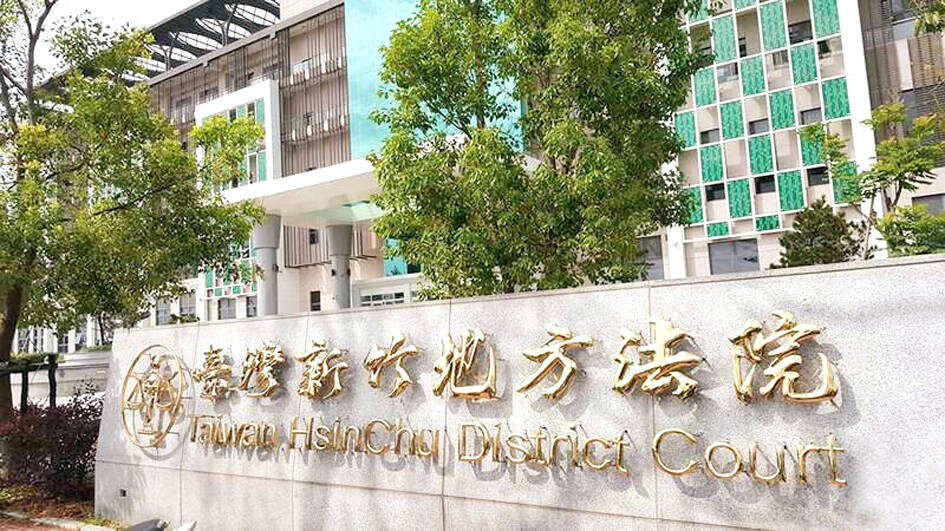A judge in Hsinchu handed down prison sentences ranging from four to six months to three Taiwanese, which were commuted to fines, for their involvement in the poaching of engineers for China’s Xiaomi Corp (小米).
Beijing Tianmi Technology Co’s Taiwan office technical director Pan Chi-kuei (潘積桂) was sentenced to four months in prison, former Xiaomi Communications chief financial officer Yu Ming-to (喻銘鐸) was given five months and Altek Semiconductor acting general manager Hsia Tzu-yu (夏祖禹) was handed a six-month sentence. The sentences can be commuted to fines, with the three paying a combined NT$600,000.
Beijing Tianmi Technology, a subsidiary of Xiaomi Corp, established a number of companies in Taiwan to poach engineers, under the guise of engaging in research and development in Taiwan, court documents said.

Photo: Tsai Chang-sheng, Taipei Times
Payments were sent to the three men through Beijing Xiaomi Mobile, another subsidiary of Xiaomi Corp, in exchange for recruiting Taiwanese to form a research and development team, it said.
In helping Xiaomi Corp poach Taiwanese talent, the men had endangered national security and contravened stipulations laid out in the Act Governing Relations Between the People of the Taiwan Area and the Mainland Area (臺灣地區與大陸地區人民關係條例), the judge said.
Xiaomi founder Lin Bin (林斌) encouraged Yu to establish a company called Yishing Technology Ltd in Taipei to serve as a front for his activities, court documents showed.
Pan transferred 24 research-and-development personnel from Beijing Tianmi Technology’s Taiwan office to Yishing, documents showed, adding that in 2021, Hsia had encouraged Pan to establish a “research-and-development resource office” under Altek Semiconductor, to which more engineers were transferred.
Aside from engaging in illegal activities that benefitted enterprises in China, the men were also unable to fully protect the rights and interests of the trading public, the judge said.

TRAFFIC SAFETY RULES: A positive result in a drug test would result in a two-year license suspension for the driver and vehicle, and a fine of up to NT$180,000 The Ministry of Transportation and Communications is to authorize police to conduct roadside saliva tests by the end of the year to deter people from driving while under the influence of narcotics, it said yesterday. The ministry last month unveiled a draft of amended regulations governing traffic safety rules and penalties, which included provisions empowering police to conduct mandatory saliva tests on drivers. While currently rules authorize police to use oral fluid testing kits for signs of drug use, they do not establish penalties for noncompliance or operating procedures for officers to follow, the ministry said. The proposed changes to the regulations require

The Executive Yuan yesterday announced that registration for a one-time universal NT$10,000 cash handout to help people in Taiwan survive US tariffs and inflation would start on Nov. 5, with payouts available as early as Nov. 12. Who is eligible for the handout? Registered Taiwanese nationals are eligible, including those born in Taiwan before April 30 next year with a birth certificate. Non-registered nationals with residence permits, foreign permanent residents and foreign spouses of Taiwanese citizens with residence permits also qualify for the handouts. For people who meet the eligibility requirements, but passed away between yesterday and April 30 next year, surviving family members

Taipei, New Taipei City, Keelung and Taoyuan would issue a decision at 8pm on whether to cancel work and school tomorrow due to forecasted heavy rain, Keelung Mayor Hsieh Kuo-liang (謝國樑) said today. Hsieh told reporters that absent some pressing reason, the four northern cities would announce the decision jointly at 8pm. Keelung is expected to receive between 300mm and 490mm of rain in the period from 2pm today through 2pm tomorrow, Central Weather Administration data showed. Keelung City Government regulations stipulate that school and work can be canceled if rain totals in mountainous or low-elevation areas are forecast to exceed 350mm in

China Airlines Ltd (CAL) yesterday morning joined SkyTeam’s Aviation Challenge for the fourth time, operating a demonstration flight for “net zero carbon emissions” from Taiwan Taoyuan International Airport to Bangkok. The flight used sustainable aviation fuel (SAF) at a ratio of up to 40 percent, the highest proportion CAL has achieved to date, the nation’s largest carrier said. Since April, SAF has become available to Taiwanese international carriers at Taipei International Airport (Songshan airport), Kaohsiung International Airport and Taoyuan airport. In previous challenges, CAL operated “net zero carbon emission flights” to Singapore and Japan. At a ceremony at Taoyuan airport, China Airlines chief sustainability